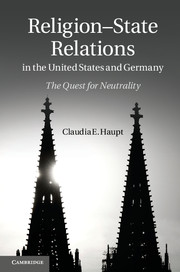5 - The role of history
from Part II - Religion–State Relations and the Role of Neutrality
Published online by Cambridge University Press: 05 January 2012
Summary
Before we further investigate the possible meanings of neutrality by turning to the founding discourses and subsequent political and social developments in Chapter 6, the role of history in constitutional interpretation more generally, and in analyzing religion–state relations specifically, deserves some thought. As evidenced by the courts’ own language seen in the previous chapter, historical arguments on the original understanding, original intent, or originally considered policy goals play an important role in the decisions of the US Supreme Court. This chapter demonstrates that the role of history appears to be considerably less controversial in German constitutional law than in the United States. In the United States, different uses of history must be distinguished; while historical arguments feature prominently in the discussions surrounding originalist methods of interpretation, they are also used by nonoriginalists in some contexts. Indeed, the Establishment Clause in particular has long been the subject of competing historical accounts.
History in German constitutional interpretation
Constitutional interpretation in Germany generally employs the canons of statutory interpretation. Historical inquiry only plays a subordinate role in German constitutional interpretation; it is generally used to reinforce a result found by employing the other canons of interpretation: textual, systematic, and teleological. Donald Kommers summarizes the approaches as follows:
Grammatical, or textual, analysis, often the starting point of judicial interpretation, focuses on the ordinary or technical meaning of the words and phrases in a given constitutional provision. Systematic, or structural, analysis seeks to interpret particular provisions of the Basic Law as part of a constitutional totality. Teleological, or purposive, analysis – a favored form of judicial reasoning in Germany – represents a search for the goals or aspirations behind the language of the Constitution. Finally, historical analysis involves the elucidation of the text by reference to the original intent of the framers or to the values they constitutionalized. The grammatical, historical, and systematic methods focus on textual interpretation. The teleological method, on the other hand, is a more open-ended approach to judicial decision making.
The interpretory emphasis is placed on identifying the “objective” meaning; in the process of interpretation “the text itself, its legal context, and, especially, teleological arguments based on contemporaneous notions of rule-specific or overarching legal values, may legitimately be considered in order to affirm, broaden, or narrow the historical understanding of the reach of the provision.”
- Type
- Chapter
- Information
- Religion-State Relations in the United States and GermanyThe Quest for Neutrality, pp. 113 - 133Publisher: Cambridge University PressPrint publication year: 2011



